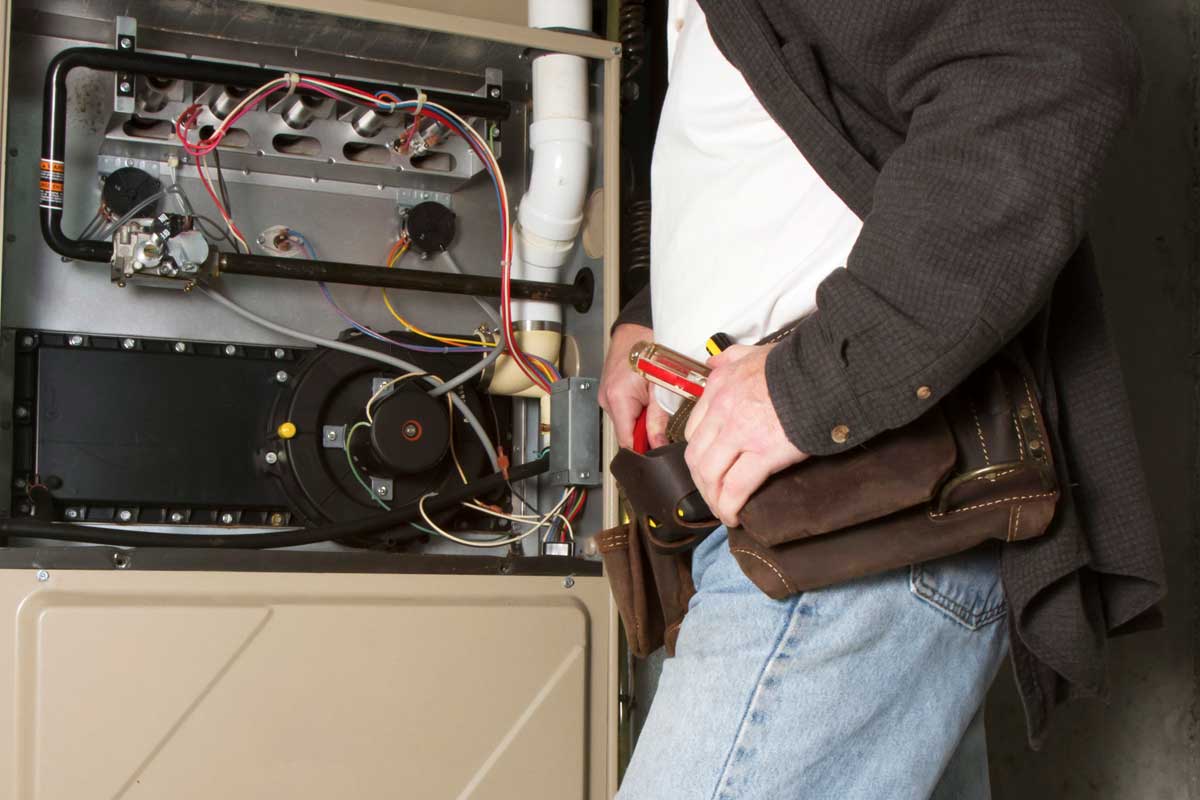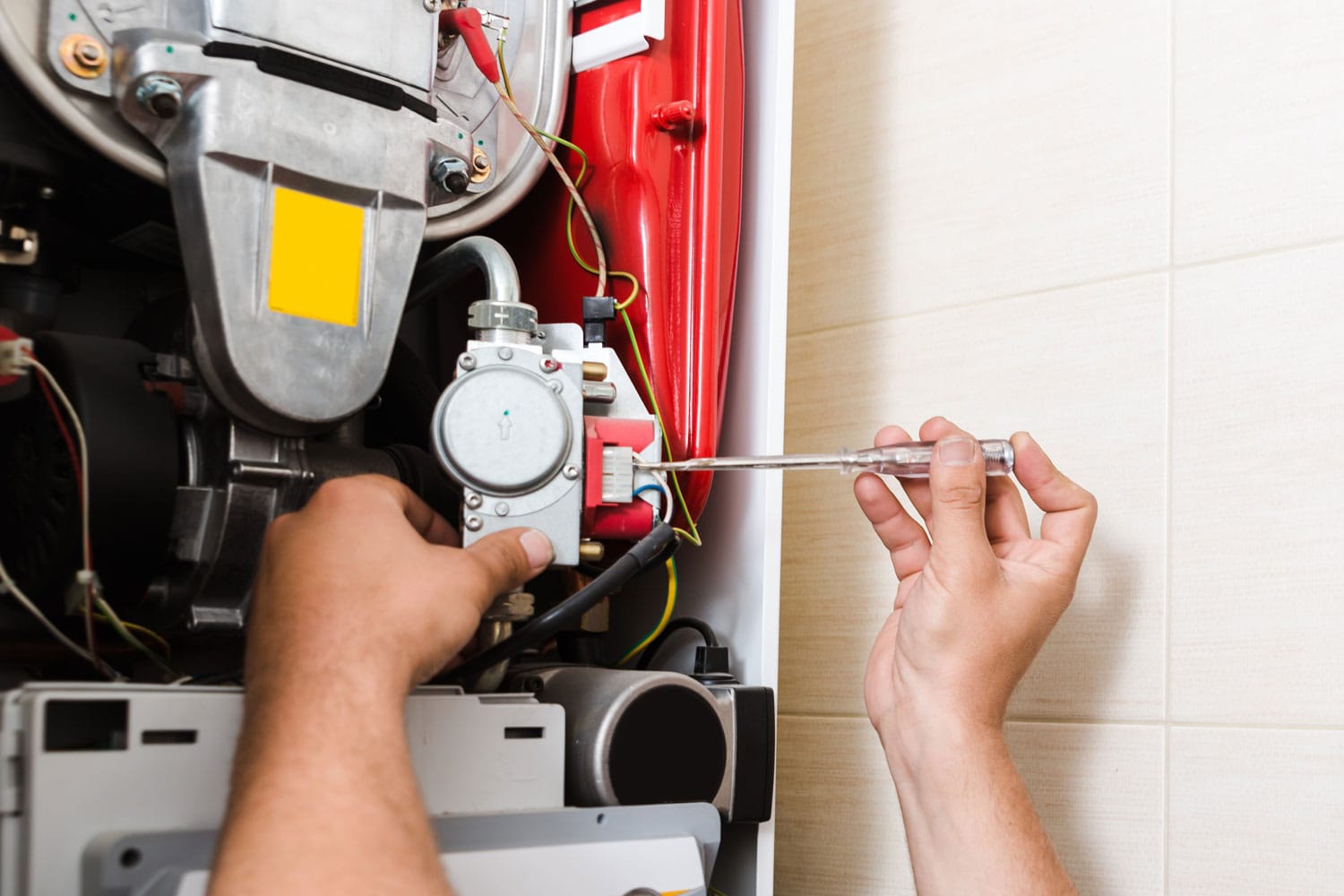The electric furnace is the less popular choice for home heating in the United States, but they certainly have their advantages. One of those advantages is the smaller size of electric furnaces compared to gas. But just how big can you expect an electric heater to be? We've done the research to tell you exactly that.
Electric furnaces come in several sizes, depending on the home's square footage that they will be heating. These sizes include:
- 1.5 tons for homes up to 1,200 square feet.
- 2 tons for homes from 1,200 to 1,800 square feet.
- 2.5 to 3 tons for homes from 1,800 to 2,500 square feet.
- 3.5 to 5 tons for homes from 2,500 to 3,500 square feet.
So now you know the estimated size you can expect an electric heater for your home to be, but you may have more questions. You may be wondering how to determine which electric furnace is best and whether it's the right fit for you. Keep reading to learn more.

Considerations For Electric Furnace Size
There are multiple factors that go into deciding how big your electric furnace needs to be. Here we will break down three of them in detail.
Geographical Climate Zone
An important consideration for determining the size of your electric furnace will be your geographical climate zone. The United States is separated into five climate zones, with the northernmost being coldest and the southernmost being warmest.
Generally, you could choose an electric furnace solely based on square footage, and it would be fine for your family. However, if you live in a southern climate, you could choose a slightly smaller and less expensive unit. While if you live in a northern climate, a slightly larger unit may heat the home more efficiently.
To make a determination based on your climate, you can research which zone you reside in and use the following guide:
- 30-35 BTUs per square foot for Zone 1.
- 35-40 BTUs per square foot for Zone 2.
- 40-45 BTUs per square foot for Zone 3.
- 45-50 BTUs per square foot for Zone 4.
- 50-55 BTUs per square foot for Zone 5.
The BTU, or British thermal unit, is the amount of energy required to heat a pound of water one degree Fahrenheit. The more BTUs a furnace has, the more warmth it can provide, and the larger the furnace will be.
Home Construction
One should always consider their home's construction when choosing an electric furnace. Is it a new build, or an old build? Is it well insulated? Does it have old windows or new windows? All of these things contribute to the home's ability to retain heat when there are dips in temperature. These factors also dictate how big of a furnace needs to be purchased.
If your home was built in the first half of the twentieth century and has not undergone significant structural updates, you may assume that it has less insulation than more modern homes and will need a slightly larger furnace. You also might want to think about improving your insulation in other ways:
Check out this window insulator kit on Amazon.
Square Footage
The most important consideration for an electric furnace, however, is your home's square footage. The larger the home, the harder a furnace will have to work to circulate heat evenly throughout it. And thus, the larger and more powerful a furnace must be.
For example, a home that is 1,200 square feet will require a furnace that is on the small side, as small as 1.5 tons. On the other hand, a home that is 3,500 square feet will require a furnace that is significantly larger, as large as 4 tons.
This electric furnace from Goodman provides 50,000 BTUs and is 1.5 tons. It is perfect for a home with smaller square footage.
Click here to see this electric furnace at Amazon.
What Size Furnace Do I Need For A 2,000 Square Foot Home?
Generally speaking, a 2,000 square foot home will need a furnace that is between 3.5-4 tons in weight and provides 90,000 to 100,000 BTUs. But let's do a bit more math and get a more specific answer.
To reach a definite conclusion, there is a simple equation that can be used based on the home's geographical location. Take the amount of BTUs needed for the chosen climate zone times the number of square feet in the home.
When this is done for a 2,000 square foot home, these are the answers which are calculated:
- For a 2,000 sq. ft. home in Zone 1, one might purchase a furnace that provides 60,000-70,000 BTUs and weighs 3.5 tons.
- For a 2,000 sq. ft. home in Zone 2, one might purchase a furnace that provides 70,000-80,000 BTUs and weighs 3.5 tons.
- For a 2,000 sq. ft. home in Zone 3, one might purchase a furnace that provides 80,000-90,000 BTUs and weighs 3.5 tons.
- For a 2,000 sq. ft. home in Zone 4, one might purchase a furnace that provides 90,000-100,000 BTUs and weighs 3.5-4 tons.
- For a 2,000 sq. ft home in Zone 5, one might purchase a furnace that provides 100,000-110,000 BTUs and weighs 4 tons.
What Size Furnace Do I Need For A 3,000 Square Foot Home?
The furnace for a 3,000 square foot home will be between 3.5-5 tons. The same formula used for above can also be used for a 3,000 square foot home.
- For a 3,000 sq. ft. home in Zone 1, one might purchase a furnace that provides 90,000-100,000 BTUs and weighs 3.5-4 tons.
- For a 3,000 sq. ft. home in Zone 2, one might purchase a furnace that provides 100,000-110,000 BTUs and weighs 4 tons.
- For a 3,000 sq. ft. home in Zone 3, one might purchase a furnace that provides 110,000-120,000 BTUs and weighs 4 tons.
- For a 3,000 sq. ft. home in Zone 4, one might purchase a furnace that provides 120,000-130,000 BTUs and weighs 4-5 tons.
- For a 3,000 sq. ft. home in Zone 5, one might purchase a furnace that provides 130,000-140,000 BTUs and weighs 4-5 tons.
Choosing An Electric Furnace

You may be on the fence about pulling the trigger on your first electric furnace purchase. Let's take a look at some of the broad benefits of the electric furnace.
Are Electric Furnaces Any Good?
Electric furnaces have their advantages, and one of the greatest of these is their ability to save you space in your home. If you have a tight area in which to place your heat source, an electric furnace may be a worthwhile consideration.
On average, electric furnaces are half the size of natural gas furnaces. For example, while a gas furnace for a 2,000 square foot home will be about 7.5 tons, an electric furnace will only be 3.5 to 4 tons.
They are also much quieter than natural gas furnaces. This is because their design is simplistic. There are fewer moving parts than a gas furnace, and of course, they are not burning fuel.
Electric furnaces last longer than gas furnaces, twice as long, in fact. These heaters are also lower maintenance than gas heaters. This is also a consideration when comparing costs.
Though they tend to cost more to operate than gas heaters, you may find that you still come out on top financially. This is because you will find as you will rarely have to service them, and they cost less to purchase and install than gas heaters. The most you will have to do in yearly maintenance is to replace your temporary filter or clean your permanent one.
Take a look at this permanent air filter on Amazon.
How Long Will An Electric Furnace Last?
An electric furnace will last between 20 and 30 years. Unlike gas furnaces, electric furnaces do not have the issue of dust particle build-up and corrosion. So they tend to need less maintenance and last twice as long.
Why Should I Choose An Electric Furnace?
An electric furnace is a good choice because, in most areas, they are of superior quality and design than gas furnaces. Some tend to shy away from the electric furnaces, fearing high electric bills.
However, one may find that an electric furnace will prove its worth both in finance and convenience as it will cost less to install and require less maintenance.
How Do I Choose An Electric Furnace?

Choosing an electric furnace involves both quantity and quality. You will want to be absolutely sure that you choose the correct size and power electric furnace for your home and climate.
In addition, you will want to choose an electric furnace that comes from a reputable brand, is energy efficient, and has excellent reviews. American Standard, Trane, and Lennox are all high-quality, trusted electric furnace brands.
In Closing
Electric furnaces are a fraction of the size of natural gas furnaces, and this is a big draw when choosing a heating system for your home. Depending on the square footage of the house, you can expect your electric furnace to be between 1.5 to 5 tons.
At first, this may sound quite large. But an electric furnace will save you space when considering that a gas furnace could be between 5 to 10 tons for similar heating power. Keep in mind to consider quality as well as quantity, and an electric furnace will keep your home warm and comfortable.
Want to learn more about heating systems? Visit these related posts:
Do Electric Furnaces Have Filters?



